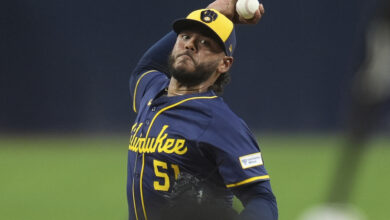
Chili Davis Fired After Criticism from Players Proved ‘Too Strong to Ignore’
There was plenty of blame to go around in the wake of the Cubs’ disappointing finish, but much of it may be leaving with Chili Davis in a cardboard box among the rest of his personal effects. The hitting coach was relieved of his duties Thursday after only one year on the job, a campaign that saw Chicago’s vaunted offense regress across the board.
And though Theo Epstein was careful to avoid calling out anyone on the team or staff by name during his postmortem press conference, he was pointed in his assessment of their shortcomings. Epstein wondered aloud why the Cubs weren’t where they needed to be with some players and lamented the way the offense broke.
But the seeds for Thursday’s news were sown pretty clearly in fertile loam that might otherwise have been viewed as a relatively innocuous comment.
“It’s our job not just to assemble a talented group, but to unearth that talent and have it manifest on the field,” Epstein said. “Are we doing everything we can in creating the right situation to get the most out of these guys?”
That’s the key right there. While Epstein praised Davis’s work ethic, he didn’t completely shrug off the notion that a philosophical change had negatively impacted the Cubs’ young hitters. Several of those hitters, however, were not so diplomatic during their exit interviews when it came to their feelings about working with Davis.
Dan Bernstein of 670 The Score tweeted shortly after the firing that a Cubs source had told him player criticism of Davis was “too strong to ignore,” and that moving forward with the coach “would have been counterproductive.” He added that some players told Epstein they felt their swings and/or approaches had been altered for the worse.
#Cubs source says that player exit-interview feedback against Chili Davis was "too strong to ignore," and it "would have been counterproductive" to go into next season with him. 1/2
— Dan Bernstein (@dan_bernstein) October 11, 2018
Mentioned last week on @Bernstein_McK on @670TheScore that some material players told Theo that they felt their swings/approaches had been altered for the worse. 2/2
— Dan Bernstein (@dan_bernstein) October 11, 2018
It’s not at all uncommon to struggle through a change, whether it be mechanical or philosophical, but you would expect to see things improve over time. It was the opposite with the Cubs, who put up big numbers in the first half of the season and then tailed off before eventually grinding to a halt.
“[T]he bottom line is we stopped walking and stopped hitting the ball out of the ballpark, especially in the second half,” Epstein said. “We hit the ball on the ground a ton, I think that was exacerbated down the end probably by a little of the stuff the guys had to deal with, the schedule and the fatigue. But it started long before that, so it’s not an excuse.”
The goal, as Epstein said, has always been for the Cubs to maintain a selectively aggressive approach while trying to hit the ball hard and in the air. In order to do that, they need to “finish the development” of their young hitters so they can make good on the potential that remained largely untapped or stunted in 2018.
Does Chili Davis bear all the blame for the stagnation of the Cubs’ offense? No, of course not. But in losing the confidence — and perhaps the respect — of his charges, it became all too obvious to team leadership that he could not be part of the solution. So who is?
The answer may be as simple as Kris Bryant coming back in 2019 at full strength and Anthony Rizzo thawing out prior to June. Javy Baez remaining an MVP-caliber performer wouldn’t hurt, either. Maybe the Cubs bring in a hitting coach who’s cool with serving as a sounding board and otherwise getting the hell out of the way.

